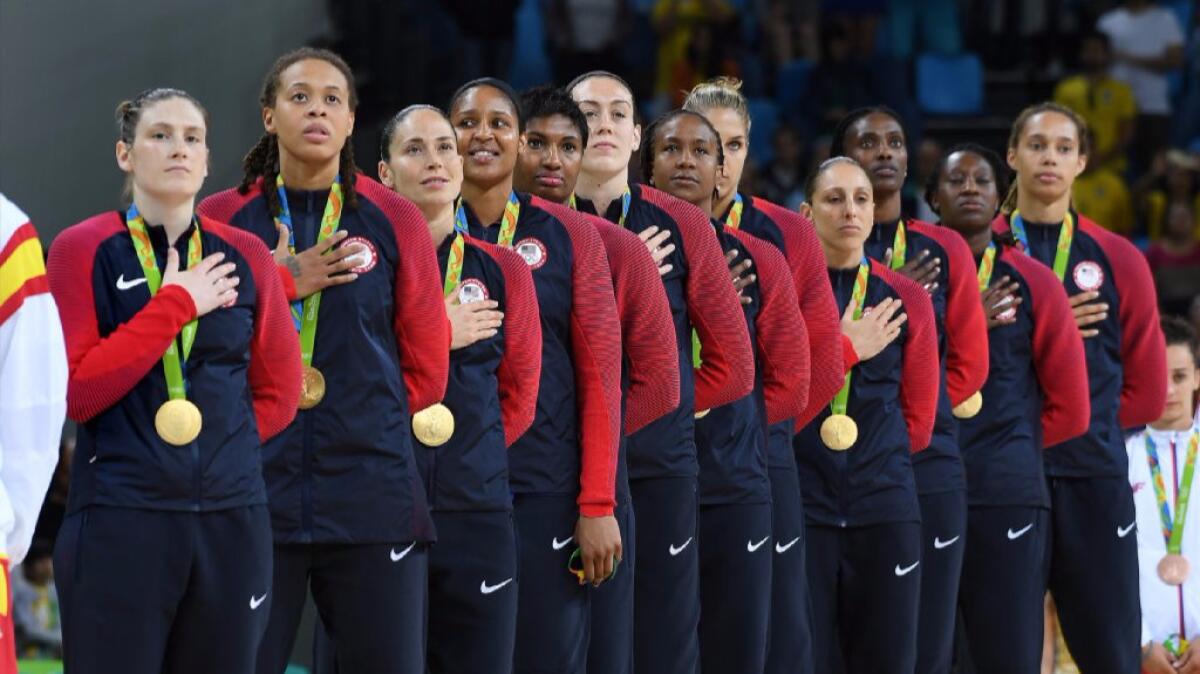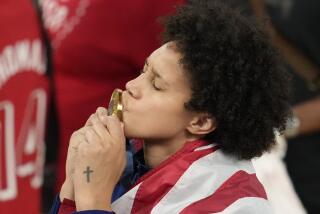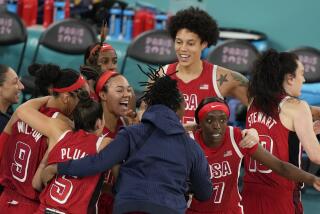Column: U.S. women’s basketball team isn’t too good for its own good, it’s simply the best ever

Reporting from Rio de Janeiro — Boring? Since when is nearly two hours of pure athletic destruction boring?
Bad for basketball? How can 20 years’ worth of consecutive victories on the world’s biggest stage be bad for basketball?
One of the most consistently dominant teams in the annals of the Olympics stepped on a Rio basketball floor Saturday in front of empty seats, feigned yawns and misguided perceptions.
They turned them all into gold, untainted and unselfish gold, poured from the greatest of American sports legacies, decorated across the chests of the greatest American team athletes.
Playing the type of game favored by John Wooden, playing with a strength not seen since the Dream Team, the U.S. women won their sixth consecutive Olympic gold medal Saturday with a 101-72 victory over Spain at a Carioca Arena steeped in awe.
It is the first time an Olympic team of any sort has won six straight titles. The U.S. women have won 49 consecutive Olympic basketball games dating back 24 years, all but one by double digits. The Americans breezed through this tournament with eight wins by an average of 29 points.
“They are so good, so good,” said wide-eyed Spanish guard Laia Palau. “Physically, technically, they are almost perfect.”
It was as dull as Diana Taurasi splashing three after three after three, stepping back from each swish with a bobbing head and a grin.
“It’s amazing what we’ve done, to be able to do that every game, to be able to play that hard,” she said. “We could have just won by 10 or eight, but this team is different, this team had a mind-set I’ve never seen before.”
It was as tedious as Lindsay Whalen churning upcourt and into the corners and down the baseline, throwing in layups, dishing back-door passes, seemingly everywhere at once.
“There’s moments when someone would do something, I kind of smile and shake my head and say, ‘That’s unreal, you shouldn’t be able to do that,’” said American forward Elena Delle Donne.
It was as drab as a Sylvia Fowles elbow, a Tina Charles rebound, or Brittney Griner backing down her smaller opponent seemingly to the sands of Copacabana.
“Right now we’re at a real high level that maybe no one has ever seen before,” Coach Geno Auriemma said.
It is a level that has gone largely unappreciated here in Rio, where the women didn’t even get to play in the large Carioca Arena until their sixth game, even though all the U.S. men’s games were played there. The women spent their first five games in a different neighborhood at a smaller venue known as the Youth Arena.
When the American women showed up for the final Saturday, the arena was only three-fourths filled. There were more cheers for Spain, mostly “oohs” and “ahhs” for the U.S.women, and no sustained chant of “U-S-A’’ until the final 20 seconds, that coming from their small section of family and friends.
It wasn’t until the Americans stepped on the medal stand, some fighting back tears, others simply beaming, that the several thousand fans remaining all seemed to realize the magnitude of witnessing arguably the greatest women’s team ever. They broke into a prolonged standing ovation that heartened an American team weary of hearing how they weren’t any fun.
“You guys are here now, we’re doing something,” said Taurasi, staring into a media crowd with a shrug. “Basketball is really important to a lot of people in the United States and no one takes it more seriously than the women. We play year-round, we sacrifice a lot of things to make sure we bring this home, and you know what? It’s OK, we’re happy.”
The two biggest reasons for the American women’s dominance aren’t titles, but legacy institutions — Title IX and the WNBA. Both the gender equity legislation and America’s only major women’s pro sports league — which began shortly after this Olympic run started in 1996 — have fostered a basketball landscape unmatched by the rest of the world.
Just ask the rest of the world.
“I think it’s because they work so good with players since they are kids,” Spain’s Palau said of the American domination. “They have all the sports, all the money, and you can see the results on the court.”
American women play hoops in college, unlike the rest of the world. American women can use the WNBA to play throughout the year, unlike many foreign players.
2016 Summer Olympics live coverage: U.S. sweeps 1,600 relays, Matt Centrowitz gets gold at 1,500 »
“It’s a great place to be born if you want to play basketball, we have the resources, we have the culture built in,” U.S. forward Maya Moore said.
Part of that culture is an unselfishness built into the women’s program, this team full of stars, nine players recording assists Saturday, nobody trying to steal the spotlight.
“We want to play a beautiful game,” Moore said.
It was beautiful even in the end, even after the game had long since been decided, when the women celebrated the final buzzer with long hugs of each other, their coaches, even their Spanish opponents.
It was cool. It was fun. It was basketball at its absolute best. If you were really bored, the American women wonder if you were really watching.
“People who say that will find any reason not to appreciate what we’re doing,” Moore said. “When I find a really good piece of fabulous cuisine of some sort, I don’t say, ‘It’s too good, it’s making all the other food look bad!’”
Moore paused and smiled.
“I say, ‘Give me another piece.’”
Follow Bill Plaschke on Twitter @billplaschke
MORE OLYMPICS NEWS
Neymar finally gives Brazil a reason to celebrate its Olympics
Why is this GE ad outperforming almost every other Olympics spot?
Shakur Stevenson falls in U.S. bantamweight boxing final, takes Olympic silver
More to Read
Go beyond the scoreboard
Get the latest on L.A.'s teams in the daily Sports Report newsletter.
You may occasionally receive promotional content from the Los Angeles Times.











